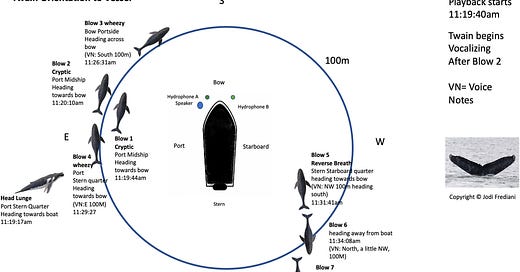Here's the proofread version with corrections:
Whales have lived on Earth for more than 30 million years. They are intelligent creatures, as are we. But we have no communication with them. We don't know what they think, why they do what they do. We just observe and wonder.
That is starting to change, and we are on the cusp (I hope) of learning to communicate with a species that isn't human. You see, in 2021, off the coast of southeast Alaska, a team of SETI scientists played a recording of whale sounds to a humpback whale and were stunned when a whale named Twain responded.
This wasn't really a conversation. We don't know what message the whale was sending, but we recorded it, sent it back, and...
Twain called back! Then circled the boat three times, surfaced, and dived again. This isn't Dorothy Parker-level repartee, but it's a call and response.
You have to start somewhere.
But think about it this way: as a species, we need to develop tools and processes to communicate with other species, and this is hopefully a first step in that direction.
We communicated with a whale. That's a good thing.
Here's what happened:
From the research vessel _Glacier Seal_, the researchers used an underwater speaker to play previously recorded humpback vocalizations. After three of these broadcasts, Twain slowly approached the boat and responded in kind, often with a nearly identical call. For 20 minutes, this call-and-response continued. There was nuance, as the scientists varied timing and tempo, and the whale matched it!
If you are a major optimist, you may speculate that Twain may have been attempting to engage in a discussion.
This is how it starts, isn't it? Even with newborn babies. At first, there's a mimicking of sound, then context and meaning are learned. First, whales in the Arctic Circle, one day...
Laurance Doyle, from the SETI Institute, says: “We’re trying to understand it so that when we get an extraterrestrial signal, we’ll know what to do.”






we just need to keep learning how to listen.